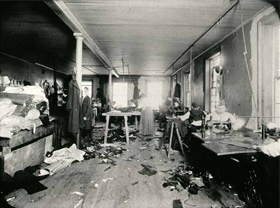ESCAPE
Part One, Chapter Six (excerpt), page 70
For some the horror stretched through many nights and days. Even now, Max Hochfield, who was stopped from turning back up the staircase to look for his sister, remembers how he became obsessed with the idea of avenging her death. He thinks now that the idea came to him during the first night after her death.
"I began to plan how to get a gun," he says. "I would go to collect the wages they owed me - and my sister. The bosses would be there. I would come in and ask for the money. I would kill them."
The trouble with the plan was that until he collected the pay, Hochfield was virtually penniless. "I couldn't buy the gun before I got the pay. And I would have no chance for revenge after I got it."
Then Hochfield had another inspiration. He was a good union man, member of Local 25 of the International Ladies' Garment Workers' Union. He would go to the union office, tell his plan, and borrow money for the gun.
He went.
"I found one of the officers," her recalls. "Nobody else was around. I told him the secret I carried in my heart. I had to avenge my sister's death.
"He listened to me and said, 'No, not that way. I know how your are suffering. But you're a young fellow. You'll ruin your life. Take my advice. Killing won't do you any good and it won't do us any good. Shooting? No; making the union stronger? yes; that's the way.' "
But even now Max Hochfield says: "Still and all, if I had had the money and if I had known where to buy a gun, maybe I would have gone through with the plan."
Listen to: Max Hochfield's oral history
Leon Stein, The Triangle Fire (New York: A Carroll & Graf/Quicksilver Book, 1962), pp. 70.
The Kheel Center would like to thank Mrs. Miriam Stein and Barbara Ismail for granting permission to use selections from the late Leon Stein's book.

